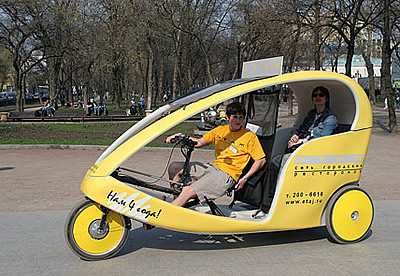Gmork is a fictional villain, while Gmörk is a decent white wine from Austria. What a difference an umlaut makes.

Gmork is a fictional villain, while Gmörk is a decent white wine from Austria. What a difference an umlaut makes.

Salon has passed on a wire service report about a Russian journalist arrested for making fun of Vladimir Putin:
The article was published by Vladimir Rakhmankov, editor of the online newspaper Kursiv in the central city of Ivanovo, said Andrei Galchenko of the regional prosecutor’s office.
The piece poked fun at Putin’s recent state of the nation address that called for economic incentives to boost the country’s plummeting birth rate. Russian media reported that the publication suggested that animals at a local zoo increased their mating, heeding Putin’s call.
Rakhmankov could not be reached for comment Wednesday. His article could not be seen, because the Web site has been shut down.
Galchenko said the investigation was launched because the article “contained phrases of an insulting nature aimed at the president.”
If convicted of insulting a representative of the authorities, Rakhmankov faces up to 12 months of corrective labor or a fine, Galchenko said.
The suspect has been summoned for questioning, Galchenko said.
The AP story then offers this context:
Since coming to power six years ago, Putin has reined in major independent television channels. Critics accuse his government of curtailing freedom of speech.
“This case illustrates the outrageous lengths that authorities will go to silence critical voices,” said Ann Cooper, the head of the New York-based Committee to Protect Journalists.
Pravda, on the other hand, talked with Rakhamankov, who saw things this way:
The author is convinced that his piece is a harmless satire on the president’s address. Rakhmankov thinks the conflict is due to his complicated relations with the regional governor, Mikhail Men.
On the radio station Ekho Moskvy, the author of the website vladimir.vladimirovich.ru,* Maksim Kononenko, noted that “the phrase ‘phallic symbol’ has been used many times over in reference to Putin.” He thinks the Ivanovo prosecutor is trying to please the president.
In the opinion of Sergey Dorenko, a commentator at Ekho Moskvy and author of a book about Putin, Rakhmankov’s article contains nothing insulting about the president. Indeed, in his view the author intended to praise Putin with his article.
At any rate, no complaints about the Kursiv article have issued from the Putin adminstration.
Tip O’Neill used to say that all politics is local. Not strictly true, of course, but local conditions do play a role, don’t they?
__________
*The site is a relentless spoof of “Vladimir Vladimirovich™ Putin.”
Molly Ivins writes:
Last week, Bush visited Yuma, Ariz., to tour a portion of the U.S.-Mexico border by Border Patrol buggy. Maybe Jorge was doing a little measuring for the $3.2-million-a-mile fence the Senate recently approved, which I guarantee will be really helpful.
Are they insane? As Arizona Gov. Janet Napolitano observes, “Show me a 50-foot wall, and I’ll show you a 51-foot ladder.”
Ah, yes: countermeasures. You’d think smart people would try to imagine them before throwing gobs of money at simple yet strangely expensive solutions to problems real and imagined.
Take the Strategic Defense Initiative (SDI). Recently we noted Putin’s remarks in his state-of-the-nation address about “high-precision” Russian missiles under development that would zigzag, thus defeating any antimissile defense. And this week the New York Times reported on the Pentagon’s plans to deploy new “interceptors” in Europe (possibly Poland or the Czech Republic), supposedly to defend against Iranian nuclear missiles (of which there are none), not Russian nukes (of which there are lots).
Fred Kaplan exposes the folly of continuing to pour money into this complex but enticingly reasonable yet relentlessly expensive program (according to Kaplan, the US spends more than $10 billion a year on this crap). To wit:
If the United States ever does deploy a system, a not terribly clever foe—the leaders of North Korea, Iran, or wherever—could evade it in two easy ways. They could fire two missiles at each target (no missile-defense test has ever been conducted against multiple targets, nor are any such tests scheduled). Or instead of firing a missile from a launch site whose location is known (thus making it easy for us to track the missile’s flight path to the target), they could load a missile on a barge, take it much closer to the target’s coastline, and fire it at such a short range that it doesn’t have to arc high into outer space; it could fly underneath the missile-defense system’s radar. (These techniques, by the way, are well-known and have been much discussed; the bad guys don’t need me to tell them how to do it.)
A good way to win an arms race is to exhaust the enemy—to field weapons systems that are very difficult and costly for the enemy to counter. Even if we managed to perfect a defense against long-range ballistic missiles, an enemy could counter it by delivering a nuclear bomb in a way that’s easier and cheaper.
I wonder who really benefits from SDI? It’s not putting my kid through college.
Even Arnaud de Borchgrave, editor at large at Sun Myung-Moon’s Washington Times and United Press International, thinks the Putin-bashing is excessive:
Beating up on Russia’s shrinking democracy has become a geopolitical blood sport from Vice President Dick Cheney down to unreconstructed cold warriors who gleefully say, “I told you so.” They see no contradiction in berating Vladimir Putin’s governing style and imprecatory Bush administration diplomatic efforts to enlist the Russian president’s support to persuade Iran to abandon its nuclear ambitions.
Even Moscow’s anti-Putin newspaper Kommersant called the Bush administration’s Russophobia an echo of the history-making 1946 Fulton speech when Winston Churchill first warned of an Iron Curtain descending across Europe from Stettin to Trieste.
He notes the provocations …
Since the end of the Cold War and the collapse of the Soviet empire, NATO’s frontiers have moved steadily eastward. First it took in three of Moscow’s ex-satellites—Poland, Hungary and the Czech Republic. Two years ago, NATO expanded by seven new members to 26 countries by taking in six former Soviet satellites: Estonia, Lithuania, Latvia, Bulgaria, Romania, Slovakia—and Slovenia. Now NATO’s frontier extends from the Black Sea coast to Finland. Its air defense shield covers the Baltic States with a tripwire presence of four F-16 fighter planes in Lithuania. The U.S. is also setting up “lilypad” bases on the Black Sea for contingency deployments in the Middle East or the Caucasus.
… and the huge risks taken by the US that affect the world economy:
Today, the U.S. borrows $7 billion a day—much of the debt held by China, Japan, Russia and Saudi Arabia—to stay in the superpower business. But Mr. Putin does not denounce President Bush for gambling with global monetary stability. Or blast the laissez-faire gambling of a derivative market of $300 trillion (U.S. Fed estimate)—not $300 billion—in bets for or against almost anything placed by wealthy hedge fund managers. Futures, forwards, options, calls, swaps are greed run amok.
Warren Buffett, the legendary investor, has raised serious concerns about the growing menace of derivatives. A derivatives meltdown would be a global financial tsunami.
Naturally, when one is talking about the Bush administration, there’s a healthy dose of hypocrisy involved:
The double standard of the Bush administration is also a sore point in Moscow. The U.S. accuses Russia of playing “pipeline politics” while the U.S. lobbies hard for the new Baku–Ceyhan pipeline through the near abroad to avoid Russian territory.
And the Russians haven’t forgotten the role played by the US in “restructuring” the former Soviet Union:
Deeply resented in Russia is how the U.S. pushed in 1991 for instant political democracy and market economics to replace communism cold turkey. This led to history’s biggest plunder. Some $220 billion was literally stolen from Russia—from raw materials and icons to gold and diamonds—and stashed in offshore bank accounts to buy choice properties from France to Fiji and Buenos Aires to Berlin. A country that had known nothing but authoritarian rule for 1,000 years was suddenly turned over to bandit capitalism—and eventually total collapse under Boris Yeltsin.
Putin is taking steps to clean up the mess, and for that he’s popular in his own country (70% approval, compared to 30% for George Bush and pocket change for his attack dog, Dick Cheney). Also, the Russians do not suffer from a starry-eyed admiration of the United States—Vanya and Lyuba are more likely to tease myth from reality than Jack and Amanda. Borchgrave concludes:
Russian news reports from the United States also reflect American democracy, warts and all. Six out of 10 young Americans between ages 18 and 24 could not find Iraq on a map of the world. Half of U.S. teachers are likely to quit within the first five years because of low salaries and poor working conditions. More than 50 percent of the U.S. prison population of 2.1 million is black.
The litany is long. But it should teach us that when we live in a glass house, with full transparency, we should ease up on the brickbats.
Indeed. (If old Arnaud is engaging in a bit of arcane disinformation, he sure fooled me.)
Make that “water filtered through a horse”:
[German soccer fans] are furious that Budweiser will be the official tipple for the World Cup, which starts next month. The American lager has secured a near-monopoly of beer sales inside World Cup stadiums and within a 500m radius of the grounds, supplanting more than 1,270 domestic breweries.
A Bavarian politician has called Bud “the worst beer in the world.” I haven’t tried every beer in the world (and I applaud Franz Maget for doing so), but I agree that Budweiser is truly awful. Wretched, really. I would rather drink water—it’s that bad.
It’s an odd projection of US power abroad. An American “beer” sponsoring a soccer event? Soccer? We can’t even manage to call it by its proper name!
It also reminds me of a brand of beer I drank rather too much of at Jimmy’s, the watering hole on 55th Street near the University of Chicago: Schlitz. Like Budweiser, it was made with rice. I got to calling it sake—I could taste the ricey overtones. Blyech.
Three cheers for American industry—lowering standards of taste everywhere!
Addendum 2006.05.24: A commenter at Newsrack Blog says Budweiser tastes better in Europe, speculating that a different formula is used. This changes things a bit, as I noted there. It might actually be illegal to sell American-style Bud in Germany as bier. In which case the beer mandated for the World Cup might not be the best in the world, but at least it won’t be the worst (despite what Herr Maget says).
Man, you can’t say anything nowadays without people actually remembering it.
Take Tom Friedman. New York Times wise man. The go-to guy for pithy analysis of a complex world. The person for whom “six months from now” never arrives:
On a recent episode of MSNBC’s Hardball (5/11/06), for example, Friedman boiled down the intricacies of the Iraq situation into a make-or-break deadline: “Well, I think that we’re going to find out, Chris, in the next year to six months—probably sooner—whether a decent outcome is possible there, and I think we’re going to have to just let this play out.”
That confident prediction would seem a lot more insightful, however, if Friedman hadn’t been making essentially the same forecast almost since the beginning of the Iraq War. A review of Friedman’s punditry reveals a long series of similar do-or-die dates that never seem to get any closer.
So says Fairness & Accuracy in Reporting, which then appends fourteen citations of Friedman’s calendrical stasis.
I don’t know if the world is flat, but I can think of something else that might be.
H1 down, H2 and H3 to go.

Katrina vanden Heuvel over at The Nation isn’t optimistic:
The good news out of Detroit is that the largest version of the Hummer—the 10,000 pound, less than 10 mpg, $150,000 Hummer H1—is being scrapped by General Motors due to lagging sales.
But, on the flip side, sales for the entire Hummer fleet—including the H2 and H3 models which boast whopping 13 mpg and 16 mpg fuel efficiencies, respectively—TRIPLED nationally between March 2005 and March 2006. According to The Wall Street Journal “people are buying Hummers precisely because of high gas prices—buyers want the world to know they can afford the gas.” (If you were wondering who the 29 percent of Americans are who still support George Bush, look no further!)

Eleven velorickshaws* currently operate in Moscow, tooling around on Tverskoy Boulevard, Tverskaya Street, and in the area near the All-Union Exhibition Center (they haven’t renamed that yet?**). You can’t tell the driver where to take you—for now, at least, the velorickshaws travel along predetermined routes (sort of like the horse-and-buggies in Central Park). A ride costs 150 rubles.
How much is that really? Well, a Caesar’s salad at Этаж (the Moscow restaurant advertised on the side of the velorickshaw) costs 195 rubles (as of today). So, a ride costs less than a salad. Not bad.
__________
*Also called pedicabs, cycle rickshaws, etc. The thing pictured above actually seems more like a cross between a pedicab and a velomobile.
**Turns out the blogger made a booboo. Since 1992 the name is the All-Russian Exhibition Centre (same acronym: ВВЦ). But apparently Muscovites are prone to slip up and say “All-Union.” An article in Наука и жизнь chronicles the transformation of ВСХВ (Всесоюзная сельскохозяйственная выставка—1939) to ВДНХ (Выставка достижений народного хозяйства СССР—1959) to ВВЦ, but inconsistently expands the last one (first Всесоюзный выставочный центр, then Всероссийский выставочный центр). Linguistic inertia, I guess.
Robert Scheer writes: “These days, even when George W. Bush is right, he’s wrong.” In his analysis of Bush’s proposals for dealing with illegal immigration, Scheer is quite even-handed—one might almost say kind. Not the usual image of the “hateful left” painted by certain commentators. The president’s “friends,” on the other hand, beat him up pretty bad.
Things are spinning out of control for the poor guy. (And when I say “poor guy,” I mean … well, you know. Crocodile tears.)